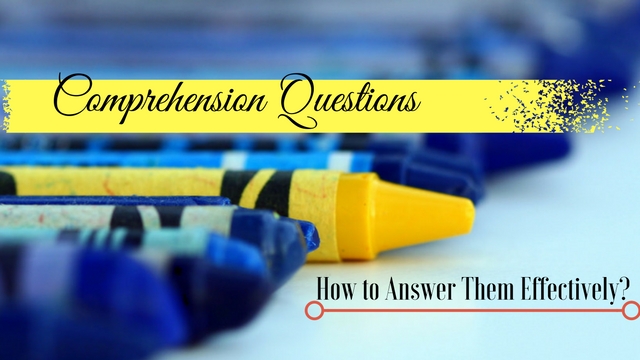Comprehension reading requires the reader to understand a certain part of a passage or a paragraph. The main purpose of comprehension reading is to understand the meaning that the given passage implies and try to answer the comprehension questions accordingly.
Comprehension reading skills are mainly used in schools and colleges where it is used to test the reading and understanding capability of the students. The most popular use of comprehension reading strategies is that these are used in international exams such as IELTS, TOEFL and so on.
Students are expected to read through the passage, understand from the essay and try to answer questions based on the given paragraph or article.

Why Comprehensive Questions are Popular?
It is a fact that questions related to comprehension reading have now become a mandatory part of every competition and various examinations, it is used to check one’s logical ability.
From elementary years of schooling itself, almost all the students are taught on how to solve passage reading and comprehension questions as most of the questions are directly asked from the passage.
But in the case of English language tests and various competition exams, answering comprehension question is not an easy task and many students often wonder on “how to answer comprehension questions more effectively”
There are many reasons why students feel this way while doing comprehension questions.
- One of the main reasons is that most of the students are so familiarized with an easy level of reading comprehension questions that they easily get flustered when they see passages that have a harder vocabulary and meaning.
- Most students fail to understand the language and hence they lose interest in studying for such answers. But in reality, with proper practice and hard work one can easily conquer comprehension questions and they can be used to gain marks easily in a competitive exam.
How to Attempt Comprehension Passages?
A comprehension test comprises of a passage which needs to be read well and answer the questions provided below it. As the base of the answers relies on the passage, it is very important to craft your answers effectively by analyzing the given passage properly.
The main purpose of these tests is to evaluate the intelligence and power of the candidate. Here are a few important tips for answering comprehension tests
- Do not use outside knowledge
- Make logical guesses
- Review the Answer at least twice
- Always read the instructions carefully
- Always go through the questions first
How to Answer Comprehension Questions Effectively?
When attempting comprehension questions, it is very important to take time and read the passage carefully. It is a very essential step that you need to follow in the initial stage.
Here are a few guidelines for answering comprehension questions
- Try to link the question to your answer
- Never provide your opinion as answers, base your answer on facts.
- The passage will never be so easy, so it is vital that you connect all the links together
- Craft your answers clearly, with perfection
- Never move out from the original question, answer it precisely
- Do not include terms like it, that, this, stuff, thing, like, she, he, them, they in your answer.
Here are a few tips and tricks that you could make use of, to conquer your fear of attending comprehension questions and enable you to answer comprehension questions satisfactorily and effectively.
How to Answer Comprehension Questions – 9 Tips:
1. Try to understand the passage:
- This is one of the most common reasons that many students complain about. Keep in mind that it is not expected of every student to understand all the lines and words of the given paragraph. No one is expecting you to study all the lines and paragraphs and understand each and every sentence.
- Try to understand the summary of the paragraph given and try to understand what meaning it is implying to. Though it may seem contradictory but when simply put, just try to eliminate all the common words, sentences and phrases and understand the true meaning of the given paragraph. Try to keep focus and attention on the keywords and the turning points of the paragraph. This helps you to understand the questions even better and makes it easier for you to answer.
2. Utilize your strengths:
- One of the most important things that a student should do is to exploit their strengths while answering a comprehension question. This helps them to save time and answer questions more effectively.
- One of the many methods that most students use is to first read the passage completely. This allows them to get an idea what the passage is about and they can be familiarized with the meaning of the passage given. But this method is not comfortable for some students, as they get confused about which keywords they should focus on and there is a chance that they might even forget the important keywords and end up reading the whole passage again.
- Another method that one can use to save time is using the “down to top” method. Here, students can first read through the questions given and then read the paragraph so that this can allow them to get the necessary answers required for the given questions.
- This saves a lot of time since the students are familiarized with questions first instead of diving into the passage itself. This also gives the students a fair advantage since they can know how to answer the questions. Try to select any one of these methods that suit your taste and requirements.
3. Managing the time given:
- Time is also an important factor while answering comprehension questions. One of the most said complaints by students is that they didn’t get enough time to answers that they knew of.
- The main reason for this problem is because most of the students spend a lot of time reading through the passage questions, that they forget to allocate time for all the other sections of the exam paper.
- Keep in mind that competitive examinations not only test your knowledge but they also test your ability to manage time and they test your reading and writing skills when subjected to a time strict limit.
- To avoid panicking and struggling to answer the questions at the last minute, one of the best methods that a student can follow is to allocate a certain amount of time for each section of the exam.
- This can be done by dividing the total exam time given, depending on the difficulty level of each section provided in the exam.
- Also, to help you manage time, even more, try to answer as many practice papers as you can. This also gives an idea on your performance and gives you an insight on how to overcome exam fear and and how well you perform under pressure during an exam.
4. Practice more:
- To perform better at comprehension questions, one of the best methods that students can use is to practice a lot of mock questions and attempt to answer as many practice papers as possible.
- One of the main reasons why many students fail to perform better at answering comprehensive questions is that the majority of them are reluctant to do practice papers at home. There might be many underlying factors such as the tough vocabulary and many students find themselves struggling to understand the meaning of the passage given.
- Through proper practice and hard work try to overcome your fears and turn them into your strengths. This will help you to face questions more confidently and effectively.
5. Upgrade your vocabulary:
- Having poor vocabulary can be very disadvantageous for you, especially when attending competitive exams, which are heavily based on time management.
- If you do not have a good vocabulary or you do not have sufficient knowledge about the words, then it might be hard for you while attempting a comprehensive question.
- The main reason being that, if you are not able to recognize and understand the word, then it might become difficult for you to understand the meaning of the passage given, and it can also interrupt your train of thought during the exam. Many students feel flustered and distracted due to this.
- Having a good vocabulary means that it becomes more easier for the student to understand the questions and it enables them to understand the meaning that the given passage is trying to imply.
- There are many ways in which one could improve and upgrade their vocabulary.
i. Try reading English newspapers daily and take notice of the various vocabulary and words that they use. This gives a basic idea about the meanings of the different words used by understanding the concept.
ii. Try to use flashcards or take help from various vocabulary books present in the market. Also, try to learn a given amount of words every day. This will increase your vocabulary and also encourages you to explore more new words.
iii. Always write down new words and terms that you come across during your daily life. This might be from, reading a book or while watching a film, listening to music and so on. Then try to revise and go through the words learned periodically for effective results.
6. Understand the level of the questions:
- While attending comprehensive questions, keep in mind that the level of comprehensive questions can vary a lot.
- Comprehensive questions used at school level vary between easy and intermediate level, while questions used for competitive exams such as GRE uses high-level comprehensive questions and they have a high difficulty rate.
- We cannot compromise with the difficulty level of the question, but we compromise our understanding capability. So, to tackle such questions, there are various methods that we can follow. These include:
- Improving one’s vocabulary and understanding of words and terms
- Practice more and more comprehensive questions
- Try to read from a wide range of articles varying in fields such as arts, science, politics, general knowledge, sports and so on.
7. Try to have a good reading speed:
- One way to beat the clock while attending competitive exams, especially while attempting comprehensive questions, is to speed up reading thoroughly and effectively.
- For effective speed reading, try to understand all the important keywords and then focus on them while trying to understand the meaning of the given passage.
- This will give you an idea on what the passage is about and will also help you to provide satisfactory answers to the questions asked about the passage provided.
- While searching for keywords, try to use a pen and mark the words that you find are important and are an essential part of the passage given.
8. Try not to rely on outside knowledge:
- While attending an advanced reading comprehension try not to make answers and assumptions that are not included within the passage topic. If you fail to do so, you can easily lose marks during competitive exams.
- Just rely on whatever information is given in the passage and attempt questions by giving answers that are mentioned in the passage only.
- Don’t jump into conclusions while answering questions, this gives off an impression that you have poorly understood the meaning of the passage.
- Try not to include your own version of answers; this can be marked wrong by the invigilator, thus leading to loss in marks. Try to stick with the information that is mentioned only in the passage itself and not on your knowledge and facts.
9. Try not to be flustered:
- Another factor that you should keep in mind while attending a comprehensive question is to have a relaxed state of mind and take your time in understanding the meaning of the passage given.
- When you come across an uncertain word or when you see a complex word, try not to get flustered and tensed just because you do not know it’s meaning.
- The best method in which you can control being tensed is to be well prepared with questions in accordance with the difficulty level of the questions being asked.
- Whenever you feel uncomfortable and tensed, try to close your eyes for a few minutes and concentrate on what you are doing. Try to keep your mind calm and silent for a while.
- This will help you to focus more on your task and hence provide you with the necessary encouragement and support needed to answer the questions.
- Practicing a lot of questions under a fixed time limit will also help you to perform better while answering comprehensive questions.
Answering Comprehension Questions Correctly:
Comprehension questions are mainly crafted in the second part of the paper. Unlike other type of objective questions, comprehension takes time to solve. Even students believe that it is time taking and skip it to solve them last.
But with good planning, great reading and understanding skills, one can easily solve the comprehension questions easily and can score full marks. So regular practice and good reading skills is very important here. As the questions asked depends upon the comprehension, so revising questions is not possible.
One also needs to grasp the content sharply so that they can easily write the answer without wasting time thinking. Some of the type of questions that you can expect in comprehensive question set are
- Questions based on vocabulary
- Questions based on grammar
- Questions based on sentence structure
- Questions based on summary
- Questions based on note making
- Inference questions
- Factual questions
Few other things to focus for answering the questions in the right manner are
- Before answering, students need to read and grasp the passage carefully
- Right tense need to be used while answering
- Avoid all type of short forms or one word answers
- Note making questions can be answered in bulleted form
- Summary questions should be paragraph format (not too long nor too short)
- Reread the passage if having an doubt while answering
Answering Comprehension Questions:
Here is a video representation on how to answer comprehension questions.
Conclusion:
Keep in mind that there are no shortcuts that you can use to answer comprehension questions correctly. The methods that you have at hand are lots of reading practice and lots of hard work. By using these two methods, it can be easy for one to conquer the difficulty of comprehensive questions. Try to have a systematic and effective plan well prepared for answering comprehensive questions, before attending the exam. This will help you to face your fears of comprehensive questions and will enable you to answer them more effectively.







































